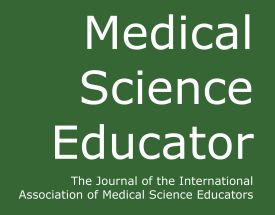
The Publications Committee wants to call your attention to interesting articles in Medical Science Educator, our society’s journal. I have briefly reviewed “How Do Medical Students Prepare for Flipped Classrooms?” Bouwmeester et al (Medical Science Educator 26:297-305:2016). The flipped classroom concept has students study the lecture and some supplementary material online before class. In class students discuss and ask questions on the study topics. In education circles, the flipped classroom has had success in pre-college education. One of the major requirements of the flipped classroom is that the students are required to study topics to be discussed in class before coming to class. This paper asked the question how medical students prepare for flipped courses in medical school for both basic and clinical science courses. This paper identifies the student’s study choices for their preparation for flipped classroom medical school courses.
The paper describes student preparation at Utrecht University for a 4-week basic science Anatomy class and a 5-week clinical Rheumatology and Orthopedics course. For both courses learning instructions stressed pre-class preparation was critical for in-class discussions and activities to be successful. For the Anatomy course all pre-class study material were prepared in an iBook format including text selections on the topics, web lectures, informative test questions, links to scientific papers, and links to additional e-books. For the flipped clinical Rheumatology and Orthopedics similar course materials were provided for students on Blackboard.
For both courses web lectures and text study were rated most highly by the students followed closely by formative questions which students used to evaluate their progress in learning. Additional books and scientific papers were rated about half as high as the lecture and text materials. The authors noted that in both courses a subset of students used formative questions, scientific papers and additional texts to a greater extent. Interestingly the subgroups of students were not the same for the two courses. This observation suggested that limiting materials to only web lectures and texts might not be beneficial to all students.
Other questions asked students to correlate self-reported use of study materials and their perceived learning strategies. In this study watching web lectures helped students discern important topics for study and how they will need to tailor their study habits for each class. Students reported that reading text materials helped motivate students to prepare for the upcoming classes and also helped students to identify material that may need to be memorized or rehearsed prior to class for better understanding.
For educators that anticipate switching teaching methods to utilize the flipped classroom this paper could be quite helpful and provide important insight for materials provided for the medical student’s education. You can access this article and many others like this at www.iamse.org by following the link to Medical Science Educator.